IUCN joins Fortune 500 companies to address plastic leaks in their supply chains
IUCN, together with the World Business Council on Sustainable Development (WBCSD), the United Nations Environment Programme (UNEP) and the Life Cycle Initiative, have joined the strategic committee of a newly launched Plastic Leak Project (PLP), which aims to help business address the plastic pollution crisis.

Photo: Siriporn Sriaram, IUCN Thailand
Co-founded by leading environmental consulting firm Quantis and ecodesign centre EA, the PLP is a multi-stakeholder initiative to develop better metrics that will help companies identify operational solutions and effective actions to reduce their plastic leakage.
To effectively close the plastic tap, companies must be able to detect the leaks within their own supply chains. For this, they need clear and reliable data on plastic leakage hotspots, which the PLP aims to provide. The PLP will develop and test a metrics-driven methodology – the Life Cycle Assessment – as well as industry-specific guidance for locating and measuring plastic leakage.
The PLP also includes private sector members Adidas, Arla, Cotton Incorporated, Cyclos, Decathlon, The Dow Chemical Company, European Bioplastics, ExxonMobil, Mars Incorporated, McDonald’s Corporation, PlasticsEurope, Sympatex, Eastman and Enel X.
“We are convinced that better metrics are needed to shape action towards closing the plastic tap and keeping our oceans clean,” says Julien Boucher, Director of EA. “We hope the PLP will significantly contribute to developing these metrics both to guide company strategies and product design.”
Many companies want to take action to address plastic leakage but lack the tools to ensure that their efforts have a meaningful impact. Many quick fixes have been identified, such as banning single-use plastics and taxing plastic bags, but these largely focus on the products at the end of their life cycles. Plastic leakage can take place during use, production, and even further back along the supply chain; therefore, effective solutions throughout the life cycle must take this into account.
IUCN is participating in PLP’s strategic committee as part of its global Close the plastic tap programme, which includes private sector engagement as a core component. As a strategic committee member, IUCN will provide reflective leadership within the project and facilitate outreach, as well as provide inputs and feedback both at the strategic and technical levels throughout the lifecycle of the project.
“IUCN has developed a plastics-specific business engagement strategy, which is goal-oriented and allows whole sectors and individual actors at local and global levels to set plastic leakage reduction goals, develop and execute action plans, and track progress,” says Gerard Bos, Head of IUCN’s Business and Biodiversity Programme. “The strategy will also help companies capture, share and scale up lessons across sectors and geographies.”
The PLP aims to release the metrics-driven methodology and industry-specific guidance early next year.
“Our Close the plastic tap programme, which includes the MARPLASTICCs project and the recently launched Plastic Waste Free Islands project, will equip governments, industry and civil society with tools, knowledge, capacity and policy options to close the plastic tap,” said Julien Colomer, Senior Programme Coordinator, ad-interim, IUCN Marine and Polar Programme.
View the Plastic Leak Project press release issued by Quantis and EA here.



